- Home
- Helen Dunmore
Counting the Stars Page 5
Counting the Stars Read online
Page 5
‘No wonder, the way you kept catching crabs,’ snaps Clodia. ‘Spread it out on that rock and it’ll dry in no time. We’d have been here in half the time if I’d been rowing.’
‘Can you row?’ he asks curiously.
‘Of course. My brother and I had a boat when we were little. There was a lake near that place in the country I was telling you about. We used to time ourselves, rowing across. We’d each have a turn, and the other one would count. But you had to count fairly. One-and-two-and-three-and… You couldn’t just count one two three, that was cheating.’ She laughs.
‘You should have rowed,’ he says. ‘I’d have liked to see it.’ He feels another stir of jealousy, of her past.
‘What, me row Aemilia past all those villas? You’re mad. They were out on their terraces staring as it was. This isn’t the most graceful of boats, but it was all I could get at short notice.’
‘Doesn’t your husband have a boat?’
‘It’s not suitable,’ she says shortly. ‘Oh, look, he’s beginning to perk up! He’s looking at me.’
She opens the cage, puts in her hand and lets the sparrow hop on to her index finger. Carefully, she begins to withdraw her hand.
‘Won’t he fly away, out in the open?’
She nestles the sparrow against her cheek, her eyes shining. ‘Why should you think he wants to leave me? Is it because you want to fly away?’
‘You know that’s impossible.’
‘Kiss me. Kiss my lips.’
‘You’ll have to move that bird.’
‘He won’t hurt you.’
He hesitates for a moment, then leans forward and meets her lips. They open, and his body shudders. He can smell sparrow, the dry mousey mustiness of the bird, mixed with the scent of Clodia’s skin and hair. The bird’s wings stir uneasily against his face. He moves back.
‘Put him in his cage,’ he says.
‘Why?’
‘You know why.’
She looks at him, measuring him. The sparrow cocks its head to one side and regards him with one bright black bead. Clodia’s lips part again and her teeth show.
‘I do like you,’ she says. ‘All right then, have it your own way. I’ll put him back, and we’ll eat. I’m hungry after watching Aemilia row so badly.’
Aemilia lifts her sweating face. She’s already unpacked the baskets and laid out dishes which contain olives, lettuce, a cold roast chicken that smells intoxicatingly of truffles, a jar of pickled capers and another of preserved pears. There is oil, wine, and a white linen napkin folded around a loaf of barley bread.
‘I love simple country food,’ says Clodia. ‘Wait, Aemilia, did you forget the thrushes?’
‘Thrushes?’
‘Yes, you fool, the thrushes that were delivered yesterday.’
‘I didn’t see any, my lady. Kitchen would’ve told me if we’d had thrushes. The master must of ate them.’
‘What, in the middle of the night? No wonder his digestion is so bad. Never mind, Aemilia, pour the water.’
Aemilia unseals the jar of water she’s brought to wash their hands before eating. The scent of lavender fills the warm air as she pours a stream into his cupped hands, and then into Clodia’s. They rub their hands, and Aemilia dries them carefully with a napkin.
‘You should wash your own hands, Aemilia,’ says Clodia, ‘since you’re going to eat with us. Here, give me the jar. Hold out your hands.’
Aemilia looks uneasy, almost fearful. ‘It’s not right for you to wash my hands, my lady.’
‘Nonsense.’ Clodia smiles into Aemilia’s face. It’s one of those sudden, bewitching smiles that transform everything he’s ever thought about her into a stab of love that makes him catch his breath. Even Aemilia’s heavy features catch light from that smile.
‘You and me, Aemilia,’ murmurs Clodia, pouring water over her slave’s hands, ‘we’ve been together a long time, haven’t we?’
Aemilia nods, moving her fingers clumsily in the stream.
‘I was a girl when my father bought her for me. Aemilia dressed my hair on my wedding night, did you know that?’
He turns away, and digs his teeth into a chicken thigh.
‘There now, Aemilia, eat. Go on, you must be hungry, and remember that we’ve got to row all the way back. You’ll need your strength.’
He watches as Aemilia takes bread and olives, modestly. She’s smiling now. Does Clodia know what she’s doing, he wonders, when she binds people to her so easily with a few words or a smile? He’s seen her do it so many times now, randomly it appears, at a party or in her husband’s house. She can lapse into an almost childlike conspiracy with some dazzled youth, or with a disapproving old man who will never credit any gossip against Clodia again once he’s felt the force of her spell.
Perhaps it isn’t random. There’s a plan, or at least a pattern. She disarms people, and turns them into allies. She seems to sense the exact moment when her charm is wearing off. She knew that Aemilia was hot, tired and resentful. And now Aemilia’s happy again, well fed with intimacy as well as olives.
And even with chicken – there’s Clodia now, offering a piece of breast from her own plate to her slave, and laughing softly as if the two of them share a secret.
In a minute she’ll realize that he’s slipping away, and call him back into her enchantment. He wants to be called. He wants it so much. He smells lavender, and the smell of Clodia’s hair. She’s let the white scarf slip off now that she’s in the shade. A few curls break loose from the knot on top of her head, and cling to her neck. Her body is curled gracefully sideways and her feet are tucked under her. Her toes are perfect: slim, straight, tipped with rosy nails.
‘You’re not drinking,’ she says to him, raising her cup. ‘Why aren’t you drinking?’ Yes, she’s noticed that he’s on the outer reaches of her spell, and she’s drawing him back. ‘You should drink,’ she says, ‘because tomorrow you may not be able to.’
‘What do you mean?’
She glances at the glittering brightness of daylight on the water.
‘It might not be day. It might be night. Day for other people, but night for us.’
‘You aren’t going to die, Clodia,’ he says.
‘Of course I’m going to die. My best friend when I was a girl, she went to bed one night and when she woke she was spotted with the plague and she couldn’t recognize anyone. Her mother said she was terrified. She thought she’d gone blind in the night. But it was death coming for her, closing up her eyes so that she wouldn’t see him.’
‘What was her name?’
‘Livia. She was very small and soft, like a bird. But she had a loud laugh. You’d never think a laugh that size could come out of Livia’s body.’
‘I promise you, Clodia, you’re not going to die tomorrow.’
‘Are you sure?’ she asks, laughing at him, but he notices with something like joy that her eyes are wet with tears.
‘Come here. I’ll hold you, and then you’ll be sure, too.’
‘The day looks bright, but there’s night all round it. Such a mass of night that all our days are just a speck of brightness in it. Night’s always there, waiting for us, saying: Go on, live, live as much as you want, do everything you choose, ignore me if you like. I know how to wait.’
‘You mean death.’
‘Yes, death.’
He strokes her hair, looking out over her head. Her hair is warm. It smells of perfume, and faintly, sharply, of her animal self. He feels such tenderness for her. Such a desire to cherish her, as if she were his own child. He’s never felt like this about any woman before. Such love. And then such hatred when she turns on him, as blank and blind as a painted goddess, with lies glittering on her face.
She wants to keep people in boxes, separate. Only Clodia can hold the keys. Her husband in one box, him in another. Who knows how many more there are? He tells himself it’s the price he’s got to pay, because how would Clodia be Clodia otherwise? Even Aemilia has her own box, whi
ch Clodia alone can open. And the people in the boxes are so grateful when the lid lifts and Clodia’s face shines down on them.
He will not be grateful. He will not be pitiful. Enough. His hand tightens on her hair, and he forces his fingers to relax. Don’t spoil the day, he reminds himself. She is here now, with you. She’s in your arms, entirely given up to you, not thinking of anyone else.
They are on a journey together. It began when she looked across at him for the first time, in her husband’s house. He looks back at himself and can’t believe how careless he was, how much at ease. He was free then. He went to that dinner as ‘one of our most brilliant young poets’, a literary lion who could roar or not as he chose. He didn’t care about any of it: all he cared about were the poems. That was what made him strong. Perhaps it was what made Clodia want him. She had so much – beauty, poise, a Roman-salon elegance that was still just a little daunting to him as a young man from Verona – and yet she wanted him. She laughed at his jokes and he shot epigrams across the table to her so that she could turn them back on him. And then she looked across at him, straight at him, and his tongue failed.
He still doesn’t know where they are going together. It’s only the journey that matters, rocked by her, caught by her, lifted up with her, raising himself on one elbow sometimes to watch the world fly past as if they were racing in a chariot to the thunder of a crowd that has bet everything it’s got.
He closes his eyes, and the darkness sparks with life. If only Aemilia would disappear. Stop scouring that little pan with sand, and vanish into the trees like the most solid and lumpish of wood spirits. But then why should all dryads be graceful? A knotted olive tree, that’s Aemilia. Blown so hard by the sea winds that she’s twisted out of whatever shape might have been dreamed for her at birth – beaten for her fruit and condemned to live long years, gripping the earth…
He opens his eyes and looks at Aemilia. Really looks, for the first time. Her eyes are on him. Her busy hands cover her watching, listening self. She doesn’t like him. He sees it fully. She doesn’t trust him and she wishes he’d go away. She stops her scouring, picks up a lump of bread and bites into it.
She’s seen too much, that Aemilia. She’s been in places with Clodia where he’ll never go. To how many other men has she given that long, measuring stare? It says: Yes, I know, for the time being my mistress can’t do without you. But we’ll see: we’ll see.
Aemilia and night are hand in hand, just biding their time…
You’ve got to stop this. Another sleepless night is on the way if you’re not careful. Tossing and sweating, listening to the cicadas give way to the owls. Wanting her so much you end up tossing yourself off like a goat scratching itself against a post. And then lying there with sweat drying in the dawn chill and still thinking of her, still thinking of her quick, small hands and the laugh stifled in her throat.
He strokes her hair. It is so alive. When Aemilia draws the comb through it before it’s oiled, Clodia’s hair rises in a cloud and spits out blue sparks, while Aemilia purses her lips like a votary tending a flame.
Her eyes are closed. She looks shadowy, as if she’s more than halfway to the other world. He could ask her what she’s thinking of, but she’d say, ‘Nothing.’
‘Listen, Clodia,’ he murmurs, ‘let’s be together tonight, even if it’s only for an hour. Surely you can manage an hour?’
But she twists away from him. Her eyes snap open and she changes into another Clodia, commanding and vital.
‘Let’s go out in the boat. There’s a breeze over the water – see how it’s picking up the surface. It’ll be cooler there. Aemilia!’
Obediently, Aemilia champs her mouthful of bread, swallows convulsively and scrambles to her feet.
Five
Clodia doesn’t want to leave Aemilia behind on the beach, although it’s plain that with three in the boat they won’t be able to breathe, let alone talk or touch, without Aemilia being part of it. But this doesn’t seem to bother Clodia.
‘Aemilia’s used to it,’ she says, and he doesn’t want to probe what she means.
‘But you can’t leave your sparrow here alone,’ he says guilefully. ‘Someone might steal him. A fox might get him.’
‘In broad daylight?’ she scoffs, but he watches the thought darken in her eyes.
‘Or a lynx,’ he adds, guessing that she wouldn’t know any more about the creatures of these woods than he does. ‘If we left Aemilia here, she could fight off a lynx with no trouble.’
Aemilia makes the sign of the evil eye. ‘The gods forbid any such creature come near us,’ she says, ‘but I’ll find a stick to beat them off.’
‘All right,’ says Clodia, ‘Aemilia can stay.’
‘You’ll need more than that little sunshade, out on the water this time of day,’ says Aemilia, ‘if you don’t want to burn black as an Egyptian.’
Familiarly, she touches Clodia’s cheek, showing off to him the complexion which she has helped to make. Clodia smiles and shrugs.
‘Fix something up then, Aemilia.’
He watches while Aemilia rigs up a canopy over the boat, using pine branches and the linen cloth she spread for their meal. She dips the cloth in water before she stretches and knots it to the branches – to cool that blessed breeze down for you – and then she hoicks the canopy into place, wedges the upright supports, and lashes them into place with the cloths she used to wrap the food. He has to admit it is clever, but Clodia seems to take Aemilia’s ingenuity for granted.
‘There, that’ll keep the sun off you,’ says Aemilia with satisfaction, looking at her handiwork.
He thinks it might be hard to row without knocking the contraption into the water, but Clodia is as skilled with the oars as she claimed. Easily, falling into rhythm together, they manoeuvre their odd little boat out into deep water.
Clodia has wrapped her white scarf around her head so that her face is half concealed. There are no other boats anywhere near them. Everyone will be sleeping out the hottest hours of the day. They’re hidden, not by night but by the extremity of day.
Sun glares off the water, although a small breeze makes its burning heat bearable. Waves cluck and slap under the hull. The oars are shipped, and the boat drifts, rocking. He feels under the bench for the anchor, drops it over the side and listens to the bump and rattle of the chain until the anchor finds its depth and settles there.
Already the shore looks like another world, shimmering in the heat haze. His head throbs, and he stares down into the depths, into the silky, clear, dark water. To the right of the anchor there’s a bulge of rock. A quivering shoal of tiny fish hangs above it, and then suddenly darts sideways. They must have felt the boat’s shadow. If this were his own lake, instead of salt sea, and that promontory his precious Sirmio, he’d know exactly what fish they were.
‘I had a dream about Livia last night,’ says Clodia.
‘Did you?’
Before today he never even knew of Livia’s existence, and yet she’s important enough to live in Clodia’s dreams as well as in her memory.
‘Yes. I was with a crowd of people. My family; friends. I think that you were there. We were by the water.’
‘Here?’
‘Not here,’ she says impatiently. ‘Livia never came here. It was by that little lake I told you about, where I raced with my brother. But in the dream the lake was larger. Everybody was talking and laughing when Livia appeared. She asked me question after question, and I answered all of them carefully. It was a while before I realized that no one else could see her, or hear her. Livia knew it too and she was smiling, as if we had a private joke together.’
‘And then what?’
‘I don’t remember. She had her hair dressed like a woman. But Livia was only ten when she died.’
The boat rocks at anchor, and the ripples push their way under the bow. He takes her hand but she doesn’t respond.
‘How did the dream end?’
She shrugs. ‘The usual way.
In a muddle. You don’t expect dreams to make sense.’
He’s quiet for a while, then he asks, ‘What questions did Livia ask?’
‘How can I remember that? How can anyone know what the dead want to know?’ she bursts out.
He tries to put his arms around her, but as he reaches out Aemilia’s canopy sags, threatening to collapse on them. Clodia recoils, staring at him angrily. ‘You’re always after the same thing, aren’t you?’ she says. ‘All right then.’
Her hands tear at scarf, linen cloak, tunic, belt. She rips off her underwear, making the boat wobble violently as she wrestles with the folds of breast-cloth and loin-cloth.
‘Clodia!’
She won’t speak to him. In a panic he realizes that she’s done what he’s always wanted her to do: in speaking of Livia, she’s opened up her past to him. And all he’s done is make a grab for her.
Clodia kicks her clothes into the bottom of the boat, and huddles on the wooden bench naked but for her bracelets and the circle of gold around her neck, glaring at him.
‘You don’t want me now, is that it?’
He reaches for her wrists, and she springs sideways. The boat tips, the canopy falls on them, tangling them both in linen and pine branches.
‘Get this bastard thing off me!’ shouts Clodia, but Aemilia’s too far away to leap to her rescue. And he can’t help it: he laughs and keeps on laughing as he drags the canopy off them.
It all happens in a second. One minute she’s on the bench, the next she’s fought her way out of the tangle, braced herself with both hands on the side, and vaulted into the water. He lunges after her and there she is, going down, her hair streaming up to him, her body sinking. A flash of panic races over him. What if she can’t swim?
Fully clothed, he throws himself overboard. The water churns with bubbles and he can’t see anything. He thrusts his face down, kicks as hard as he can and forces himself underwater. He opens his eyes and sees her below him, twisting, half hidden by her hair. He dives after her.

 The Ingo Chronicles: Stormswept
The Ingo Chronicles: Stormswept The Deep
The Deep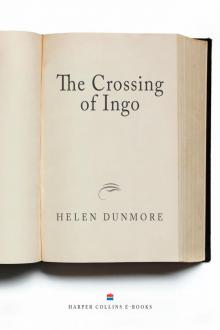 The Crossing of Ingo
The Crossing of Ingo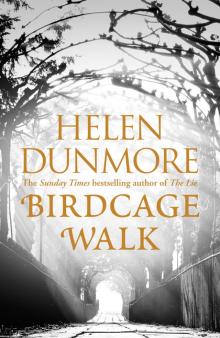 Birdcage Walk
Birdcage Walk Glad of These Times
Glad of These Times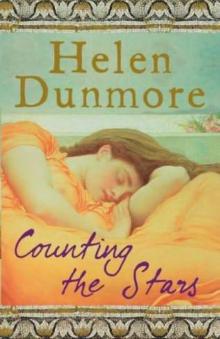 Counting the Stars
Counting the Stars With Your Crooked Heart
With Your Crooked Heart Burning Bright
Burning Bright House of Orphans
House of Orphans Mourning Ruby
Mourning Ruby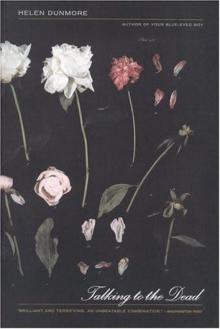 Talking to the Dead
Talking to the Dead Exposure
Exposure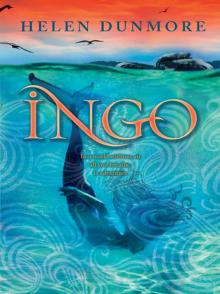 Ingo
Ingo The Malarkey
The Malarkey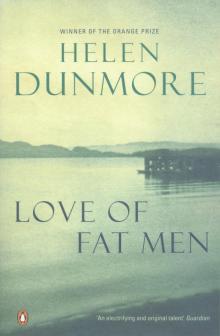 Love of Fat Men
Love of Fat Men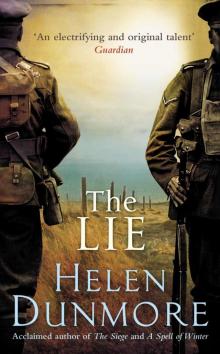 The Lie
The Lie The Siege
The Siege Inside the Wave
Inside the Wave Counting Backwards
Counting Backwards The Land Lubbers Lying Down Below (Penguin Specials)
The Land Lubbers Lying Down Below (Penguin Specials)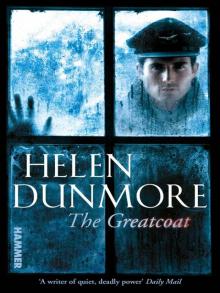 The Greatcoat
The Greatcoat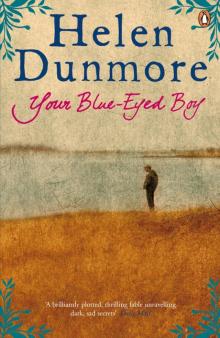 Your Blue Eyed Boy
Your Blue Eyed Boy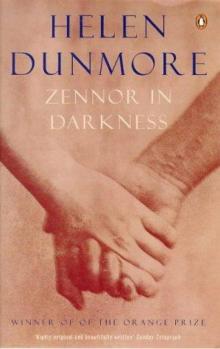 Zennor in Darkness
Zennor in Darkness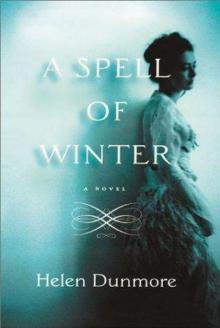 Spell of Winter
Spell of Winter Out of the Blue: Poems 1975-2001
Out of the Blue: Poems 1975-2001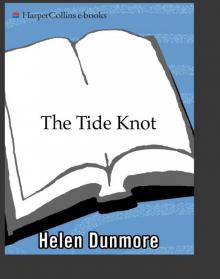 Tide Knot
Tide Knot The Betrayal
The Betrayal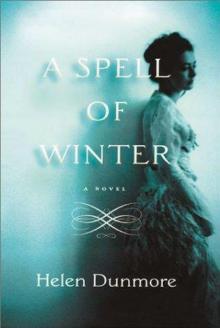 A Spell of Winter
A Spell of Winter Out of the Blue
Out of the Blue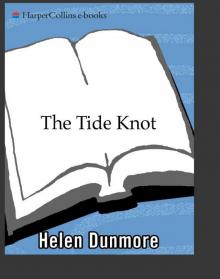 The Tide Knot
The Tide Knot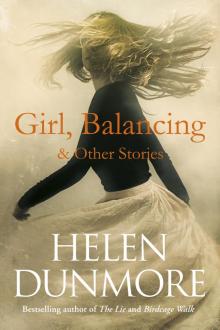 Girl, Balancing & Other Stories
Girl, Balancing & Other Stories Betrayal
Betrayal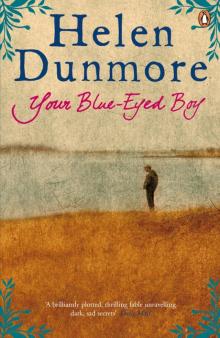 Your Blue-Eyed Boy
Your Blue-Eyed Boy